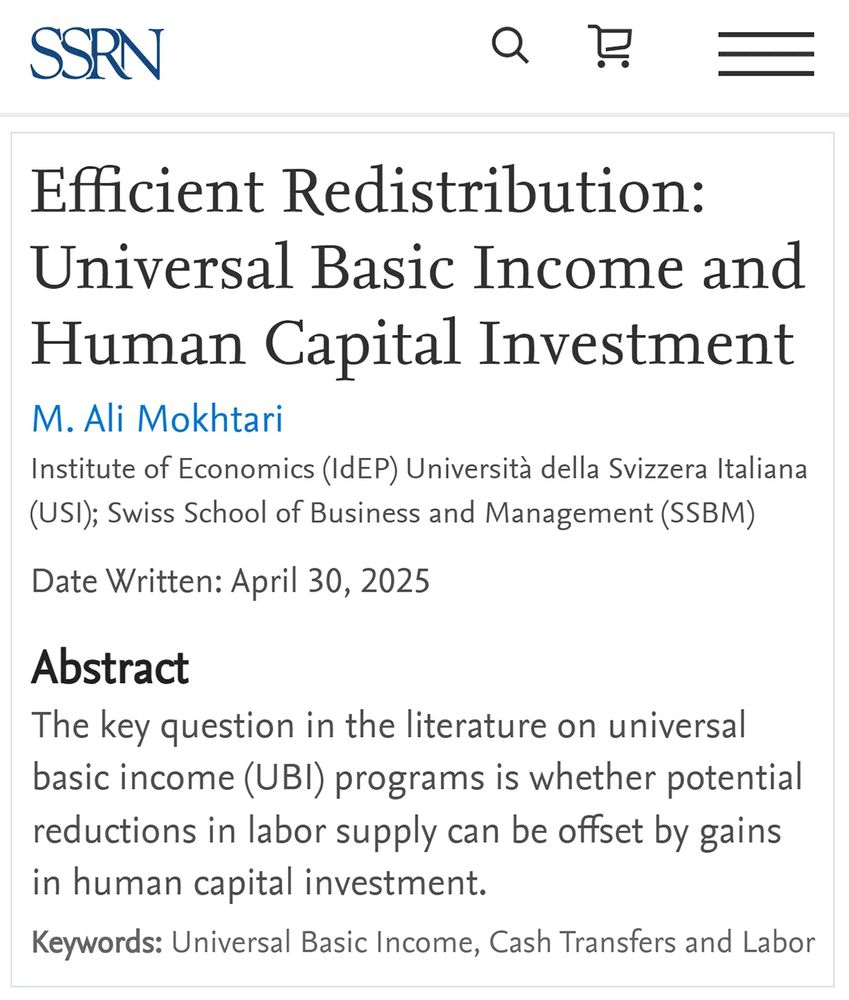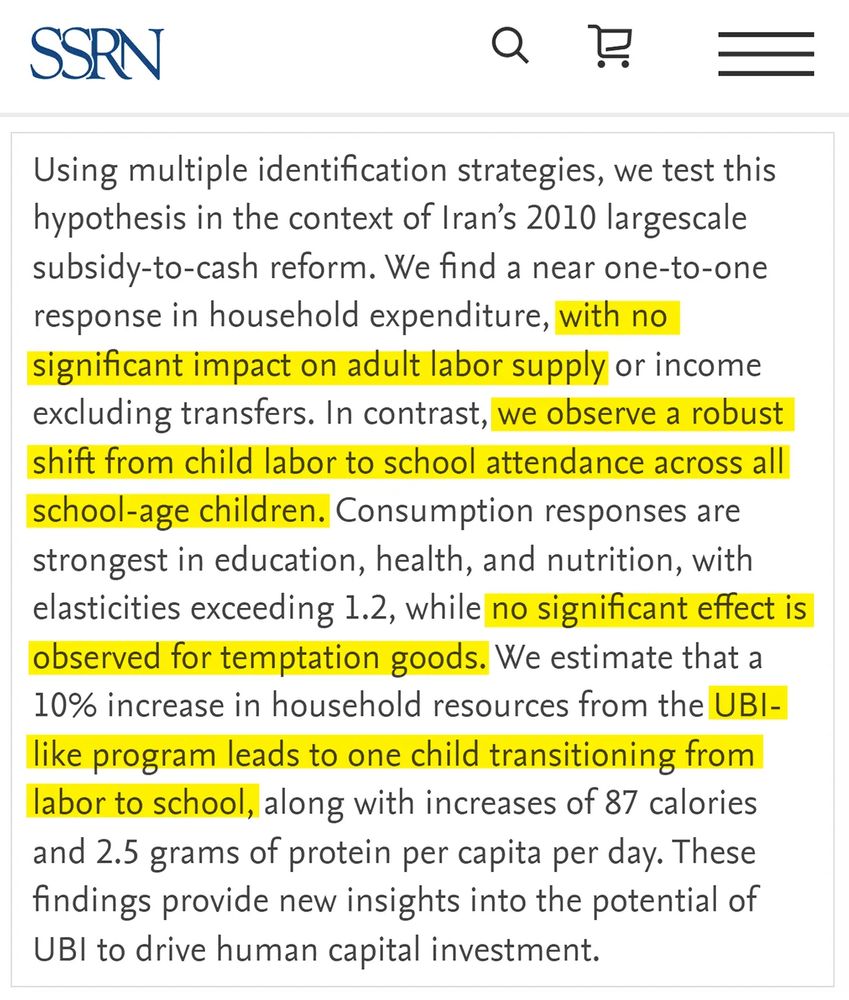
Abstract
Recent estimates suggest that eliminating fossil fuel subsidies could prevent 1.6 million premature deaths annually by reducing air pollution, while also addressing the unequal distribution of resources. How unequal are the benefits of these subsidies? Using Iranian household expenditure data (1984–2019) covering three major subsidy reforms, this study estimates the inequality-reducing impact of replacing fuel subsidies with direct, universal, and unconditional cash transfers. Our robust estimates show that reallocating USD 1 per capita per day from fuel subsidies to direct cash transfers reduces the Gini coefficient of expenditure by 8 %. These findings underscore the redistributive potential of such reforms and their role in fostering more equitable and sustainable policy design.
New study of Iran's almost-UBI shows that replacing fossil fuel subsidies with a universal and unconditional cash transfer reduces consumption inequality by 8% per $30/mo per person.
Study by @alimok.bsky.social
www.sciencedirect.com/science/arti...
10.10.2025 15:15 — 👍 35 🔁 22 💬 2 📌 0
Redirecting
Thanks to @lorenzkueng.bsky.social (advisor), Molly Lipscomb (JEEM co-editor), and two anonymous referees. Grateful to USI and IdEP for a supportive environment. Paper: doi.org/10.1016/j.je...
09.10.2025 20:40 — 👍 0 🔁 0 💬 0 📌 0


Robustness: Sanctions ≠ driver. No systematic link with inequality around reforms; cash correlates with reductions. Results hold with sanction controls.
09.10.2025 20:40 — 👍 0 🔁 0 💬 1 📌 0


Long-run inequality: Expenditure Gini, 1984–2019, with reform timings marked. Post-reform drops align with cash waves.
Distributional anatomy: Decile shares over time, shown relative to Decile 8 (reform-neutral benchmark). Bottom deciles gain post-reform.
09.10.2025 20:40 — 👍 0 🔁 0 💬 1 📌 0

Global context: Fossil-fuel subsidies are huge and concentrated in resource-rich economies; Iran ≈ $127B (latest year data). @iea.org
09.10.2025 20:40 — 👍 0 🔁 0 💬 2 📌 0

Mechanism: Household balance sheet microdata show a net cash surplus among poorer households—transfers more than offset higher energy costs. (Figures below)
09.10.2025 20:40 — 👍 0 🔁 0 💬 1 📌 0
Redirecting
New causal evidence in JEEM: Iran’s move from fuel subsidies to (near) universal cash transfers reduces inequality. Reallocating about $1 per person per day cuts the expenditure Gini by ~8%.
Paper: doi.org/10.1016/j.je... #EnvironmentalEconomics
@jeem-econ.bsky.social @usiidep.bsky.social @usi.ch
09.10.2025 20:40 — 👍 3 🔁 0 💬 1 📌 1
Everywhere UBI is relatively expensive. In Iran, the program was also expensive, accounting for approximately 7% of the country's Annual GDP during the first three years.
23.05.2025 20:49 — 👍 0 🔁 0 💬 0 📌 0
In the U.S case, Hoynes and Rothestein (2019) discuss that there would be also social stigma. Many poor households shy to register or receive such a specific aid, because of social norms pressure.
23.05.2025 20:06 — 👍 1 🔁 0 💬 1 📌 0
That’s why further research is essential. Previous studies already suggest that labor supply reductions from cash transfers are generally modest—not the dramatic declines some fear.
23.05.2025 18:42 — 👍 0 🔁 0 💬 0 📌 0
The truth is, we still know very little about the long-term impacts of Universal Basic Income. We don’t yet have enough evidence to say whether the short-term inflationary costs outweigh the long-term benefits.
23.05.2025 18:42 — 👍 2 🔁 0 💬 1 📌 0
The benefits might be far greater if the transfers support human capital investment—leading to a more productive labor force, reduced crime, higher long-term growth, and overall welfare gains, even for those funding the program.
23.05.2025 18:42 — 👍 1 🔁 0 💬 1 📌 0
Yes, demand may rise for basic goods, but what is the actual magnitude of inflation? And more importantly—what if the basic goods in question, such as nutrition and education, significantly improve quality of life and outcomes for the next generation?
23.05.2025 18:42 — 👍 1 🔁 0 💬 3 📌 0
When no one pays for UBI, demand naturally increases. But when high-income individuals—or heavy energy users, as in the case of Iran—bear the cost, their demand decreases, effectively turning the policy into a redistributive mechanism.
23.05.2025 18:09 — 👍 1 🔁 0 💬 1 📌 0
Efficient Redistribution: Universal Basic Income and Human Capital Investment
<div>
<p>The key question in the literature on universal basic income (UBI) programs is whether <span>potential reductions in labor supply can be offset b
Notably, there is a large shift from child labor to schooling among children under 18 and the strongest consumption responses in education and nutrition, and no significant rise in spending on temptation goods. The paper is available on SSRN, papers.ssrn.com/sol3/papers....
#UBI
#Econtwitter
23.05.2025 17:45 — 👍 4 🔁 0 💬 0 📌 0
Transfers, net of energy prices change, exceed 50% of income per capita for the bottom 10% of the population and districts. Results reveal a significant reduction in inequality and challenge pessimistic views on labor supply reductions and increased consumption of non-productive goods.
23.05.2025 17:45 — 👍 3 🔁 0 💬 1 📌 0
My new findings on Iran’s 2010 Energy Subsidy to Cash Program show that it uniquely resembles a true Universal Basic Income (UBI) at the national level—even under the strict criteria of Hoynes and Rothstein (2019).
23.05.2025 17:45 — 👍 6 🔁 2 💬 1 📌 0
Efficient Redistribution: Universal Basic Income and Human Capital Investment
<div>
<p>The key question in the literature on universal basic income (UBI) programs is whether <span>potential reductions in labor supply can be offset b
Inflation and sanctions have historically been high in the country, so income gains are adjusted for price changes. All monetary values reflect monthly inflation adjustments. Beyond that, non-monetary consumption of essential and productive goods rose significantly—but only for the bottom 60%.
23.05.2025 17:23 — 👍 4 🔁 0 💬 1 📌 0


MASSIVE new study of Iran's UBI-like monthly cash program:
- Adult work didn't go down
- CHILD LABOUR went down to focus on school
- Drug use didn't go up
22.05.2025 19:08 — 👍 162 🔁 55 💬 7 📌 6
Canadian Human Published Creative Wordsmith Academic Intellectual LGTBQIA+Ally Post-Colonialist living on unceded territories: I support First Nations
Bloomberg Distinguished Professor (SAIS & Carey Business School), Johns Hopkins University. Political economy, Brazil, and a little bit of futebol.
Assistant Professor of Economics, USI Lugano
@usiidep.bsky.social
Project Leader, Rockwool Foundation Berlin
@rfberlin.bsky.social
Official profile of Università della Svizzera italiana (USI). News and event from our campuses and beyond.
Profilo ufficiale dell'Università della Svizzera italiana (USI). Notizie ed eventi dai nostri campus e oltre.
The Becker Friedman Institute at the University of Chicago supports inquiry on significant economic and policy questions. Repost/Follow ≠ endorsement.
Follow us on socials: https://linktr.ee/bfisocials
I am an Economist leveraging the assignment mechanism in the field to test theory and help non-profits, govts, and anyone who will listen! My goal is to (hopefully!) change the world for the better. My picture is with my oldest son!
Econometrics professor @Ca’ Foscari university of Venice, father of two young boys, rugbyman & nba fan
Official account of the Department of Economics (IDEP) of USI, Lugano
I am a Postdoctoral researcher at the ifo institute and LMU Munich. My research interests include applied labor economics, automation, tourism, and education.
Website: https://sites.google.com/view/giuseppedigiacomo/home
Applied Micro, Political Economy & Stuff @pegdev.bsky.social, University of Stuttgart
Website: https://sites.google.com/view/felix-schoenenberger/
Canada's Largest Basic Income Community 🍁
Join 150K+ supporters across every riding & major party
https://linktr.ee/UBIWorks
Unconditional / Universal Basic Income (UBI) knowledge resource
Founder & CEO of UBI-focused nonprofit ITSAfoundation.org
Host of The Basic Income Show youtube.com/scottsantens
My #UBI FAQ: scottsantens.com
Contact me: linktr.ee/scottsantens
Macroeconomist at Cambridge University | Fellow in Economics at King's College | Co-founder and Director of King's Entrepreneurship Lab | Co-Director of #climaTRACES lab | Deputy Director of the Cambridge Executive MBA.
Professor of Economics, www.lorenzkueng.com, USI Lugano.
Research: Household Finance.
PhD: UC Berkeley.
Affiliations: Swiss Finance Institute (SFI), Center for Economic Policy Research (CEPR).
Formerly: Northwestern University, Chicago Fed, NBER.
Empowering individuals and communities through grassroots initiatives & education to act now for basic income. Let's show them our numbers!
Join basicincomeaction.org
DMs Open ❤️ Re-Shares
Edited by Nathaniel Hendren and @wwwojtekk.bsky.social
https://www.sciencedirect.com/journal/journal-of-public-economics
JEEM publishes theoretical and empirical papers addressing economic questions related to natural resources and the environment. Est. 1974.
https://www.sciencedirect.com/journal/journal-of-environmental-economics-and-management
One of the oldest and most prestigious journals in economics, the Journal of Political Economy presents significant and essential scholarship in economic theory and practice. https://www.journals.uchicago.edu/journals/jpe/about











